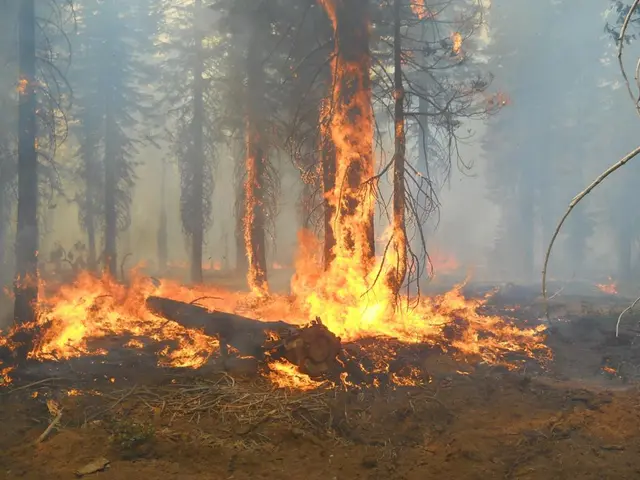Navigating the Maze: Lifespan of Trans People under Trump Adminstration
Living Conditions of Transgender Individuals under the Trump Administration
Elijah Nicholas, a trans man, doesn't fret about his American passport for now. Expiring in 2030, he can still breathe easily, but the future is clouded with uncertainty.
Under the current regulations, Elijah wouldn't get a passport reflecting his male gender. The US State Department only issues passports that match the gender assigned at birth. Gone are the days when a third gender option was available. The US State Department announced this move, implementing an order from President Trump, shortly after his inauguration.
"The silence of gender identity," criticizes Elijah, "trans people and non-binary individuals are silenced." This change could pose risks for these folks during foreign travels, as they may confront unforeseen challenges.
According to Sharon Horne, a mental health researcher at the University of Massachusetts Boston, the new regulations could escalate trans people's risk of harassment, discrimination, and threats at borders. Horne also warns of the worrying spikes in mental health issues among those affected.
A study published in 2020 in "The Lancet Public Health" examined the correlation between the gender listed on identification papers and the mental health of adult trans and non-binary individuals. Those with papers carrying their correct name and gender were less likely to experience severe mental distress, suicidal thoughts, and plans than those whose papers didn't.
However, this passport issue is just one of the ways the US government targets trans individuals. Another example is their military ban. The US Department of Defense is aggressively pushing for this exclusion. In February, President Trump signed an executive order barring trans people from women's sports, especially in public schools and universities. Non-compliant states risk losing federal funds.
When political pressure obscures their rights, LGBTQIA+ individuals report increased depression and anxiety. Trans people particularly feel the brunt of it.
WorldPride amid Despair and Insecurity
Many LGBTQIA+ individuals in the US are currently grappling with a "space of fear and insecurity." This year, Washington faces a peculiar challenge - hosting WorldPride simultaneously celebrating the 50th anniversary of the first Pride event in the city.
Rainbow symbols have adorned the city since mid-May. However, the question remains - what does it mean to celebrate Pride in these uncertain times? "Resistance," says Elijah without hesitation," while we secure our footing, our rights."
Elijah dwells in Georgia, where he works as an actor, author, and trans activist. In Washington, he's here to co-organize the National March for the Visibility of Trans People, a WorldPride partner event. Scheduled for the last day of the festival, this march will ensure trans people won't be diminished.
Safety remains the top priority for the march's organizers, and they're working closely with WorldPride to ensure that. The day before the vibrant WorldPride Parade marches through the heart of the capital, a separate rally expects a crowd of thousands from across the country. Finally, they'll march together to a large Freedom March on the National Mall. The march, beginning at the Lincoln Memorial, will meander past the White House to the Capitol. Elijah hopes for something powerful - to demonstrate to Washington and the world that trans people can't and won't be erased.
Sources: ntv.de, Franziska Spiecker, dpa
- Donald Trump
- Transgender
- Discrimination
- USA
- LGBTIQ
Enrichment Data:
Additional Insights:
- Impact on Transgender and Non-binary Individuals: Trump administration's policies, including the passport update regulation, the military ban, and exclusion from sports, have significant implications for transgender and non-binary individuals' well-being, rights, and safety. They face increased stress, anxiety, and suicidal ideation due to a lack of documents accurately representing their gender identity[1][4].
- Legal Challenges: Legal actions against the Trump administration's policies suggest wider resistance. For instance, a federal judge in Massachusetts blocked the enforcement of the passport policy, indicating its failure in meeting the required judicial scrutiny[4]. On-going lawsuits by organizations like Lambda Legal and the ACLU may pave the way for future progress.
- Wider Social Implications: The Trump administration's policies toward trans people create a hostile environment that encourages discrimination, stigmatization, and marginalization. This environment challenges the basic human rights and dignity of trans individuals and contributes to a culture of intolerance[2].
- WorldPride 2025: Work towards an inclusive, welcoming WorldPride happening in New York City in 2025 aims to counter the political climate by emphasizing the resilience, courage, and diversity of the LGBTQIA+ community[3].
- The current regulations under the Trump Administration's community policy prevent trans men like Elijah Nicholas from obtaining a passport that reflects their gender, causing concerns about potential risks during foreign travels and mental health issues.
- Science and health-and-wellness researchers have found a correlation between trans individuals' identification papers and their mental health, with those holding documents with their correct gender less likely to experience severe mental distress, suicidal thoughts, and plans.
- Besides the passport issue, other policies by the Trump Administration, such as the military ban and exclusion from sports, particularly in public schools and universities, further target trans individuals, causing increased anxiety and depression within the LGBTIQ community.
- In the realm of politics and crime-and-justice, legal challenges against these policies, led by organizations like Lambda Legal and the ACLU, offer hope for future progress in protecting the rights and safety of transgender and non-binary individuals.
- The Trump Administration's policies continue to have wider social implications, fostering a culture of intolerance and discrimination towards trans individuals, echoing concerns in war-and-conflicts, sexual-health, and mental-health discussions. Meanwhile, events such as WorldPride aim to counter this climate and celebrate the resilience and diversity of the LGBTQIA+ community.








